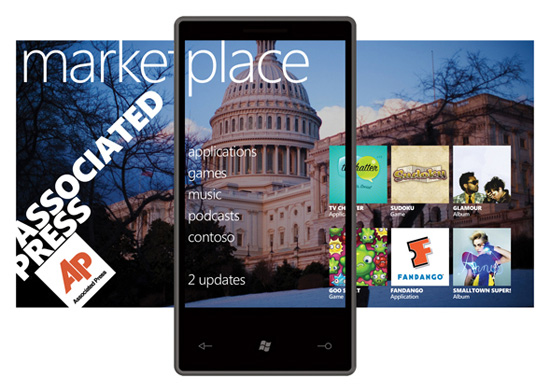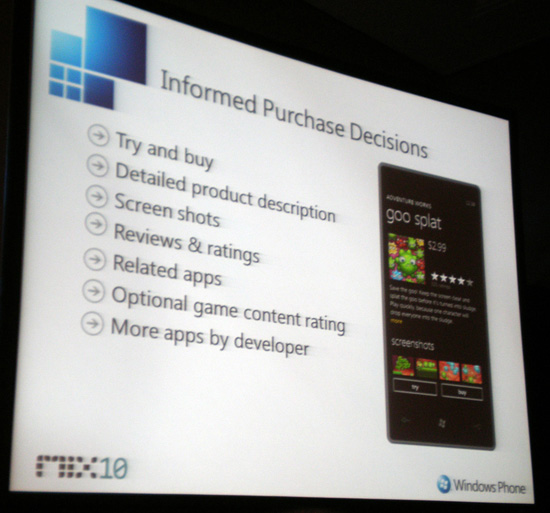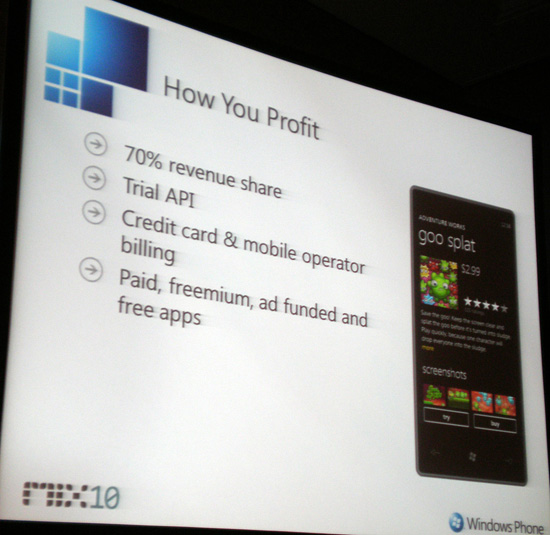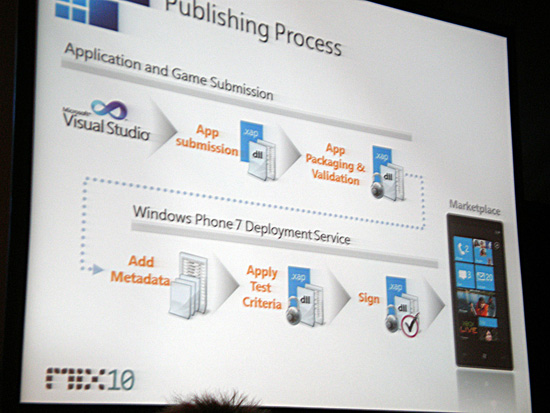Windows Phone 7: The AnandTech Guide
by Brian Klug on March 21, 2010 12:00 AM EST- Posted in
- Smartphones
- Windows Phone 7
- Mobile
Marketplace and Third Party Applications
The Windows Phone Marketplace is the exclusive way for users to install applications on WP7S - though corporate developers building applications for a few hundred people were promised their own alternative before launch. The marketplace hub itself is, for all intents and purposes, very similar to Apple's App Store marketplace model. There's one-time billing method entry, support for updates, categories, featured and rated applications, and everything we've grown used to expecting from an "App Store."
However, there are a few notable and important exceptions. First off, the marketplace will be the exclusive place to purchase LIVE enabled games, music, and third party applications. Virtually everything you can buy on the phone will be sold through marketplace.

Next on the list is that marketplace will allow an API for developers to distribute trials of their software. Developers can design whatever trial expiration criteria suits them; during sessions examples such as elapsed time, level based, or number of application launches were tossed around. After the trial expires, the marketplace works just like you'd expect it to - users can be upsold either directly through the application, or the marketplace directly. This is a boon for try before you buy shopping, which is still absent from Apple's App Store, leading popular developers to create "lite" titles. Of course, in that scenario, user data is lost when migration from lite to full versions takes place. Because the trial marketplace application in most cases is the full version (just with trial checks inside), user data will not be lost when a user upgrades to the full version.

In addition, carriers can sideload and preload applications on WP7S. This is the "Contoso" menu item in the above picture (Pocket PC and Windows Mobile users should be familiar with the reference). Letting carriers value-add through both sideloading and preloading their own branded applications is a mixed bag. On one hand, it's a bargaining chip WP7S has to bring to the table when OEMs sit down and negotiate bringing hardware to a specific carrier. On the other, it ultimately leads, again, to a fractured user experience. Out of the box, applications available on one carrier will not be available on the other. At present, no carrier has truly offered a compelling application, but it isn't farfetched to see something like that happening eventually. There's also of course the stigmata attached to buying a phone preloaded with a bevy of carrier-branded applications. There's a perception that a clean wiped device is exclusive or higher-end - it's the OS X and iPhone effect here - and Microsoft will have to be careful about what it allows carriers to preload to avoid overwhelming end users or damaging its brand.
But what carriers are really going to like is the optional way the marketplace can bill app purchases. In addition to traditional credit card billing, billing through the mobile operator is now an option, one which will no doubt appease carriers even more worried about becoming "dumb pipes." No details were disclosed during MIX10, but there's no doubt some revenue sharing that will take place between Microsoft and carriers should they go this route. Developers still get the disclosed 70% revenue share either way.

Third party applications will present themselves primarily as "tiles" on the main launch page (note that third-party applications can only be single-wide tiles; double wides are reserved for first-party applications). Additionally, tiles can also extend themselves through appropriate "hubs." This is where Microsoft hopes to begin to chip away at the application-centric design other platforms are built around. An example given was how WP7S' colorize application both exists as a tile, and an entity within the pictures hub - it can be launched in either place since ultimately it modifies pictures.
The remainder is all the details. Marketplace application submission will begin this coming summer, illustrating that Microsoft wants a strong catalog of applications at launch beyond what we've already seen. At present, the marketplace will support application sales in 30 markets worldwide, illustrated below. There's still a $99 yearly fee to be part of the development program and submit applications, although developers can collect revenue even after their yearly subscription has expired. In addition, debugging on a hardware of your choice (rather than the emulator) will require an unlock through a registration process with Microsoft.
.jpg)
Marketplace - Application Vetting
Marketplace also comes with the caveats attached to a uniform application distribution model, not the least of which includes a validation, vetting, and digital signature process for all applications. Let's be clear - WP7S only runs signed code, and to get that signature, you'll need validation. Each time you run the application, WP7S will check that application's signature against the marketplace, both to check that it's valid, and that hasn't been revoked. Yes, marketplace has an application kill-switch.

Application Submission Workflow
There are three major categories of testing criteria thus far. Microsoft is calling them "test criteria pillars":
- Technical Validation
- Applications are reliable
- Applications are resource friendly
- Applications are free of malicious software
- Applications do not interfere with phone functionality
- Policy Validation
- Meets Microsoft standard for global content policies
- Meets application type guidelines
- Market Validation
- Evaluated against regional policies - is it legal to sell in this market?
- Localization review
They've strongly emphasized that this process will be completely open, that an NDA will not be required to see the application provider agreement, and that they will "publish everything about how the marketplace works." I was on the edge of my seat the whole time for more specific details or a screenshot of a developer access panel with clearly marked status steps, but no such details came. I get the feeling they're still trying to strike some kind of balance between policy requirements and openness that actually fosters useful and innovative applications. Microsoft insists that this kind of application vetting is necessary to deliver "really good end user experiences." Part of that is only allowing "developers with the best intentions" into the marketplace.
There's also the disturbing "content policies" smell test under policy validation. This is a nod to the arguably draconian policies that recently resulted in sweeping deletion of softcore porn applications from Apple's App Store. Microsoft is apparently taking a similar route of having applications pass a content test for validation - at a PG-13 rating. Sorry folks, that means no softcore porn applications in the marketplace.
As far as turnaround time from submission to approval to marketplace presence ready-for-purchase, Microsoft is hoping to meet a 5 day turnaround time for 98% of content. Thus far, they've been successfully meeting that bar for Windows Mobile's "Windows Marketplace for Mobile," hopefully there's equally little friction for WP7S' "Windows Phone Marketplace."
So on one hand, Microsoft is pinky-swearing they won't be evil and will actually tell you what they're doing during application approval, but on the other, haven't given any specific examples. This is another circumstance where the details just haven't been fleshed out yet. Time will tell exactly how open this process is, and whether in practice it's any different than Apple's controversial App Store model. Microsoft has already launched a large number of partners, and demonstrated at least 14 third party applications already in development, which you can see in the gallery below.
















55 Comments
View All Comments
nerdtalker - Sunday, March 21, 2010 - link
Noted and fixed! Thanks!Cheers,
-Brian
StormyParis - Sunday, March 21, 2010 - link
It seems so close to the whole iPhone thing, that if I were MS I'd be embarassed... a lot of pride swallowing must have been going on.My issue is, I can't find a good reason to want these phones. Even Office integration doesn't cut it, because the hardware is so gimped that I'd never, ever, want to do any office work with it. The rest is just regular smartphone stuff. As with Apple, I lose a whole lot of freedom of features (forced to use IE ? IE ??? back to web 0.8, guys). And my personnal guess would be that for the same loss, I get less in exchange, in terms of ease of use and features.
Hopefully Google and Nokia will manage to keep their ecosystems open, because those "censored apps, censored hardware, no extensions nor upgrades" e-dystopias have me worried and slightly despondent.
NJoy - Sunday, March 21, 2010 - link
avid user of WM for last 5 years, now I'm so disappointed, it's even depressing. They just have killed everything what I liked about WinMo. SadCSMR - Sunday, March 21, 2010 - link
Extremely disappointing to be given a locked down system from Microsoft, missing essential capability that's been around for over a decade.Instead of continually expanding features and technology, and providing a better user interface, we have a locked down system with a long list of basic missing features. Windows Mobile has been downgraded from an operating system to firmware with this release.
Even the user interface, supposedly "stylish" is almost everywhere an inefficient use of space to present information. It's fine to pander to customers who want that... but now there's no way to customize it to something better.
Other features removed: No microSD cards, incredible! No file system access! Anyone who understands what a file is should avoid this system.
I can see the benefits for the computer-illiterate, but for us and for business users why not make an open "Windows Mobile 7 Business" version without the limitations?
wolrah - Sunday, March 21, 2010 - link
The carriers need the shiny new phones to attract customers, not the other way around. The consumer cares more about the thing they're carrying rather than the network it's on (see iPhone and AT&T). With that in mind, the experience of a mobile phone OS should be about the user, not the carrier.The ability for carriers to screw with phones is almost universally a bad thing. The CDMA carriers' love of BREW on dumbphones, Verizon's obsession with crippling devices, AT&T's lockdown of the Backflip and the previous heavy limits on "bandwidth intense" iPhone apps, etc. I don't think I need to go on to show that the carriers should never be allowed to influence phones in the slightest. I can not come up with a single example where carrier modifications were a benefit for the end user even on dumbphones, much less on smartphones.
The bit about appeasing carriers worried about becoming "dumb pipes" is the problem in a nutshell. They are dumb pipes, that's the point. They provide the spectrum and backhaul lines that connect my phone to the PSTN and Internet. Saying that telecom carriers don't want to be dumb pipes is like saying that Ford doesn't want to be a car company. It just doesn't make sense, since that's exactly what they are.
trochevs - Sunday, March 21, 2010 - link
I agree with you. Unfortunately we have two serious obstacles here. First is the brainwashed US consumer who thinks he/she is getting better deal by getting locked phone from US carrier for free or discounted price from artificially inflated price of unlocked phone.The US consumer are scripted so well and never stop to think for a minute. Just notice poor sales figures in USA for unlocked phones from Nokia, Sony and Google are.
Second is the monopolistic behavior of US carriers. For many years they did not allowed unlocked phones on their networks. Only when real threat of regulation become evident they start allowing it. But they pile your phone bill with extra fees that makes you think twice. Not only that, but they keep charge you exact same monthly service fee even when everyone knows that this fee includes the price of the phone.
anactoraaron - Sunday, March 21, 2010 - link
not to mention the monopolistic reality of government agencies allowing these carriers to buy out all of the smaller, local companies. There is this trend of broken economics going on here and we, the "end users," are the ones paying for it (literally). Once where I live here there were 4 smaller companies my "unlocked" phone would work on.... now "unlocked" phones are almost all just ATT and T Mobile.trochevs - Sunday, March 21, 2010 - link
Well. Thanks Brian for great article and thanks AnandTech for great coverage of Windows Phone 7 so far.From what I see WP7 is targeted directly against Apple iPhone not Google's Android. Apple is attacking HTC to hurt Android, but looks like Steve jobs did not learn his lesson. The real hit will come from Microsoft again. MS is taking advantage that all mobile operators are not happy with Apple keeping iPhone away from them. It will be slow switch for many iPhone users, but MS has the financial power to keep the WP7 alive for a while.
Google's Android has own problem now. Google compromised their relationship with open source community in order to meet the US mobile operators and handset manufactures demands, but now Android is facing the real possibility that US carriers are going to use Android as bargaining power to get better deal from MS. Just like Asus and other OEM did with early versions of netbooks and using have-baked Linux distributions. So Google needs to decide between Open Source community or discontinue Android in the long run and accept that US carriers will hold the key and can lock out Google if they want to.
So the key would be. How well Mr. Jobs and Mr. Schmidt have learn the lessons form recent and not so recent past. It will be fun watching. And the key player could turn to be Intel with their MeeGo.
FITCamaro - Sunday, March 21, 2010 - link
They're definitely going to have to allow applications like Pandora to run in the background or no one will buy the phone. I use Pandora on my Droid. If it killed Pandora any time I wanted to check my email, send a text message, or browse the web, I'd be be pissed.DigitalFreak - Sunday, March 21, 2010 - link
Unfortunately, it looks like they're going down the iPhone route and locking everything down. App store, no SD cards, etc. Really not surprising I guess when you look at how they handled the Xbox 360.